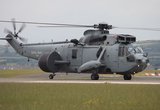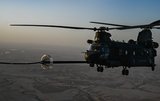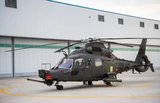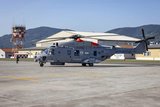Boeing Mesa Site Earns Environmental Certification
Boeing today announced that its Rotorcraft Systems facility in Mesa has earned International Organization for Standardization (ISO) 14001 certification, making it the latest Boeing site to validate its environmental management system.
Boeing is working to have all of its major manufacturing facilities certified to the ISO 14001 standard by the end of 2008. ISO 14001 is considered a global benchmark of an organization's commitment to understand and continuously improve its environmental performance.
Independent auditors from DNV, an accredited certification body of quality, environmental and safety management systems, audited the Mesa site Sept. 23-26 to ensure an established environmental management system exists and that employees understand their roles in protecting the environment.
"Achieving this certification is a major accomplishment and an important demonstration of our commitment to continuous environmental improvement," said Mesa Site Leader Tony Ham. "The fact that our audit report included seven noteworthy items demonstrates that our environmental management system is mature and in good shape for long-term sustainment and continuous improvement."
The auditors commended the Mesa site for its environmental achievements, especially its energy conservation and recycling programs and the use of chrome-free primer on Apache helicopters.
Mesa joins Auburn and Everett, Wash.; Exmouth, Bankstown and Fishermans Bend, Australia; Huntsville, Ala.; Kennedy Space Center, Fla.; Long Beach, Calif.: Philadelphia; Portland, Ore.; Salt Lake City; San Antonio; St. Louis; Sylmar, Calif.; and Winnipeg, Canada, as Boeing sites that have achieved ISO 14001 certification.
The Boeing Company is committed to pioneering environmentally progressive technology and relentlessly reducing its environmental footprint. Since the introduction of the first Boeing jetliner, airplane emissions of carbon dioxide have been reduced by around 70 percent and noise footprints have been reduced by approximately 90 percent. Boeing targets improving fuel efficiency and reducing carbon dioxide emissions of each new generation of commercial airplane by at least 15 percent compared with the airplanes they replace. Boeing has set aggressive targets to increase solid-waste-recycling rates and energy efficiency by 25 percent and to reduce greenhouse-gas emissions intensity by 25 percent at its major manufacturing facilities by 2012, with a comparable goal for hazardous-waste reduction. For more information, visit the company's 2008 Environment Report at www.boeing.com/environment
More from Defence Helicopter
-
![Germany to send WS-61 Westland Sea King helicopters to Ukraine]()
Germany to send WS-61 Westland Sea King helicopters to Ukraine
Germany has committed to sending Ukraine six of its 21 retiring WS-61 Westland Sea King multirole, amphibious helicopters.
-
![Boeing secures $271 million to advance modernisation of US Special Operations' MH-47G Chinook]()
Boeing secures $271 million to advance modernisation of US Special Operations' MH-47G Chinook
Boeing has clinched a major contract modification to further its backing of the US Special Operations Command’s MH-47G Chinook aircraft modernisation effort.
-
![Dubai Airshow 2023: South Korean homegrown helicopters make international debut]()
Dubai Airshow 2023: South Korean homegrown helicopters make international debut
Two KAI helicopters, the KUH-1E utility helicopter and the Light Attack Helicopter (LAH), have taken centre stage at the Dubai Airshow 2023.
-
![Italian Navy receives final NH90 helicopter]()
Italian Navy receives final NH90 helicopter
The Italian Navy now boasts a fleet of 56 NH90 helicopters comprising 46 SH-90As and 10 MH-90As.
-
![Argentina seeks AW109 and CH-46 Sea Knight helicopters]()
Argentina seeks AW109 and CH-46 Sea Knight helicopters
The Argentinian Air Force (FAA) and the Argentinian Naval Aviation Command (COAN) are looking for options to upgrade their helicopter fleets.
-
![DSEI 2023: Lockheed to produce about 40% of Black Hawks on UK soil if it wins NMH contest]()
DSEI 2023: Lockheed to produce about 40% of Black Hawks on UK soil if it wins NMH contest
Lockheed Martin promises a boost to the British job market and export opportunities, while strengthening ties with Poland and positioning the UK for a future in rotorcraft technology in the event of a New Medium Helicopter competition triumph.

























